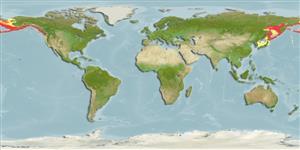>
Gadiformes (Cods) >
Gadidae (Cods and haddocks)
Etymology: Gadus: Latin, gadus = a fish, cod? (Ref. 45335); chalcogrammus: Name from the Greek 'chalcos' meaning brass and 'gramma' meaning mark (Ref. 6885).
More on author: Pallas.
Issue
This species is placed in the genus Gadus in Eschmeyer (CofF ver. Jan. 2012: Ref. 89336). More studies are needed for a complete revision of all genera of Gadidae.
Environment: milieu / climate zone / depth range / distribution range
بوم شناسي
دريايي; لب شور موجوداتی که در محدوده وسیعی از آبهای آزاد از نزدیک بستر و یا روی کف بستر، در قسمت های میان آبی تا سطح آب و در برخی گونه ها با قابلیت پرواز، زندگی و تغذیه می کنند.; غير مهاجر; تغييرات عمق ? - 1280 m (Ref. 50550), usually 30 - 400 m (Ref. 54255). Polar; 68°N - 34°N, 129°E - 120°W (Ref. 54255)
North Pacific: from Kivalina, Alaska, to the southern Sea of Japan and to Carmel, California, USA. The occurrence off the northern part of Baja California (Mexico), as reported from Quast and Hall, (1972) (Ref. 6876) is apparently erroneous.
Length at first maturity / Size / Weight / سن
Maturity: Lm 36.9 range ? - ? cm
Max length : 91.0 cm TL جنس نر / بدون خواص جنسي; (Ref. 2850); بيشينه وزن گزارش شده: 3.9 kg (Ref. 56335); بيشينه سن گزارش شده: 28 سال ها (Ref. 55701)
خارهاي باله پشتي (کل) : 0; شعاع نرم باله پشتي (کل) : 38 - 48; خارهاي باله مخرجي: 0; شعاع نرم باله مخرجي: 33 - 42. The dorsal fins are widely separated. The pelvic fins have a slightly elongated filament. The lateral line is continuous to about the back end of the first dorsal-fin base; it is interrupted at the read of the body. On the head are lateral line pores. Body color is olive green to brown on the back and becomes silvery on the sides and pale ventrally, often with mottled patterns or blotches.
The adults usually live near to the sea floor, but sometimes they also appear near the surface (Ref. 1371). They perform diurnal vertical migrations (Ref. 1371). They mainly feed on krill (Ref. 39882) but they also eat fishes and crustaceans (Ref. 6885). The adults which are spawning are often solely captured for their roe (may have been the case in the first years of the fishery in the U.S., but hasn't been true for some time. In 1994, the North Pacific Fishery Management Council/NOAA enacted an amendment to the Bering Sea and Gulf of Alaska Fishery Management Plans effectively banning the practice of stripping roe and discarding the carcasses, R. Rogness, pers.comm. April 2022). The meat is used to produce surimi (this is an imitation of shellfish meat) (Ref. 28499). They are traded as fresh fish, boneless flesh, in frozen blocks or as surimi. The fish is cooked in the microwave, steamed or fried in butter (Ref. 9988).
Oviparous, sexes are separate (Ref. 205). Congregate in dense schools to spawn, usually at 50 to 250 m depth.
Cohen, D.M., T. Inada, T. Iwamoto and N. Scialabba, 1990. FAO species catalogue. Vol. 10. Gadiform fishes of the world (Order Gadiformes). An annotated and illustrated catalogue of cods, hakes, grenadiers and other gadiform fishes known to date. FAO Fish. Synop. 125(10). Rome: FAO. 442 p. (Ref. 1371)
وضعيت در فهرست قرمز IUCN (Ref. 130435: Version 2024-1)
خطر برای انسان ها
Harmless
استفاده انسانی
ماهي گيري – شيلات: با ارزش تجاري بالا; ماهي ها ي سرگرم كننده: بله
ابزارها
گزارش های ويژه
بارگيری XML
منابع اينترنتي
Estimates based on models
Preferred temperature (Ref.
123201): 0.4 - 5.6, mean 1.6 °C (based on 444 cells).
Phylogenetic diversity index (Ref.
82804): PD
50 = 0.6250 [Uniqueness, from 0.5 = low to 2.0 = high].
Bayesian length-weight: a=0.00631 (0.00550 - 0.00724), b=3.03 (2.99 - 3.07), in cm total length, based on LWR estimates for this species (Ref.
93245).
Trophic level (Ref.
69278): 3.6 ±0.1 se; based on diet studies.
Generation time: 6.5 (3.6 - 7.8) years. Estimated as median ln(3)/K based on 25
growth studies.
جهندگی (Ref.
120179): پايين ، كم, كمينه زمان لازم براي دو برابر شدن جمعيت 5/4 – 14 سال (Musick et al. 2000 (Ref.
36717); tmax = 28).
Prior r = 0.29, 95% CL = 0.19 - 0.44, Based on 16 full stock assessments.
Fishing Vulnerability (Ref.
59153): High vulnerability (59 of 100).
Climate Vulnerability (Ref.
125649): High vulnerability (55 of 100).
Nutrients (Ref.
124155): Calcium = 12 [8, 19] mg/100g; Iron = 0.185 [0.122, 0.296] mg/100g; Protein = 16.5 [15.1, 17.9] %; Omega3 = 0.337 [0.159, 0.741] g/100g; Selenium = 14.5 [5.7, 33.5] μg/100g; VitaminA = 11.2 [2.0, 57.3] μg/100g; Zinc = 0.445 [0.340, 0.563] mg/100g (wet weight); based on
nutrient studies.
